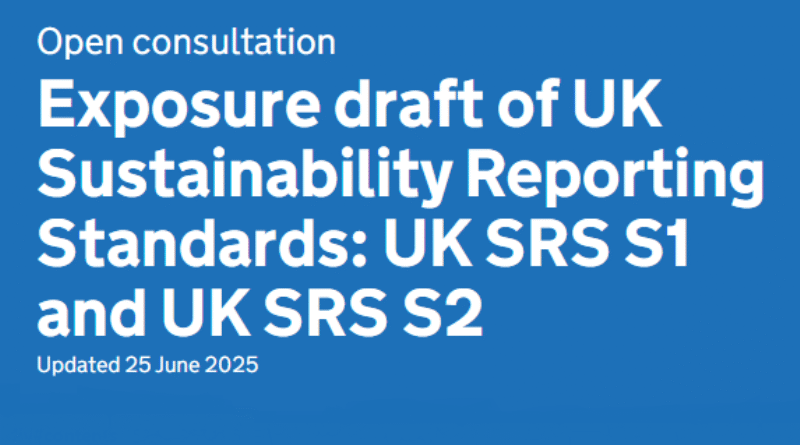Exposure draft of UK Sustainability Reporting Standards: UK SRS S1 and UK SRS S2
1. Developing a disclosure and assurance framework for sustainability-related financial disclosures
Introduction
1.1.Making the transition to an economy that is climate resilient and sustainable is essential for long-term economic growth. One of the 5 missions of this government is to make the UK a clean energy superpower – delivering clean power by 2030 and accelerating to net zero. This will support growth through the creation of hundreds of thousands of good jobs across the UK and protect our economy from the future price shocks that reliance on fossil fuels creates, while delivering a range of social and health benefits.
1.2. Within this context, the government has set out its ambition for the UK to be the world leader in sustainable finance. This includes delivering a regulatory framework to support sustainable growth and enable the private sector to realise the opportunities of the transition. According to Bloomberg New Energy Finance (BNEF), the UK will need to see £130 billion of total investment into the transition each year on average to 2050 to stay on track for their Net Zero Scenario, the majority of which will need to come from the private sector. This is over double the 2024 level of low carbon investment. To meet this investment gap, government, regulators and industry will need to work in partnership, to put in place the policy and legal frameworks to support investment decisions. An important objective of this work is to deliver decision-useful and credible information about sustainability and climate-related financial risks and opportunities to investors. This is also fundamental to building and promoting secure and sustainable growth.
1.3. As part of the Mansion House package in November 2024, HM Treasury (HMT) set out the steps that government is taking to strengthen the UK’s attractiveness as a destination for inward investment and as a centre for sustainable finance. This included a consultation seeking views on the development of a UK Green Taxonomy and acted on a recommendation from the Transition Finance Market Review by co-launching the Transition Finance Council with the City of London Corporation. In addition, the government is taking forward measures to enhance integrity and trust in the sustainability-related information produced for financial markets. HMT has published draft legislation regarding the regulation of environmental, social and governance (ESG) ratings providers, while the Department for Energy Security and Net Zero is consulting on the implementation of integrity principles for voluntary carbon and nature markets.
1.4. Alongside this work, the government is committed to delivering decision-useful sustainability-related financial information to the financial markets. It is a well-established principle that investors need rigorous and comparable financial information regarding the future prospects of the companies in which they invest. As an extension of this principle, the government is keen to ensure that investors have information they need to make informed decisions about the sustainability-related risks and opportunities that would reasonably be expected to affect an entity’s financial prospects. At present, requirements are already in place through climate-related disclosure obligations introduced in 2022. Reflecting significant international developments in recent years, the government is considering how to build on those requirements to create an enhanced regime for sustainability-related financial disclosures that is fit for the future.
1.5. The development of an enhanced UK sustainability disclosures regime will support the government’s ambitions for long-term sustainable growth, creating greater awareness across the economy regarding the systemic risks that market participants face and how they should be managed. At the same time, for regulation to be effective, government must actively consider the needs of businesses and the impacts of regulation upon them. Reporting entities require time to put in place processes and systems to disclose information, while the UK’s legal frameworks and organisational structures require modernisation to reflect changes in reporting and assurance practices. In addition, the government is keen to ensure that future requirements fit together in a coherent, proportionate and cost-effective manner. This is aligned with the objectives of the government’s ongoing wider review of non-financial reporting, which aims to streamline and modernise the UK’s currently complex legal framework, contributing to the government’s ambition to reduce the costs of regulation for business by 25%. As a result, the government’s focus when designing a future regulatory regime is limited to those economically significant entities where there is likely to be strong public and investor interest.
1.6. With these considerations in mind, the government is taking a phased approach to modernising the UK’s framework for corporate reporting, ensuring that market participants have sufficient opportunity to influence the UK’s future legal framework. The first phase consists of 3 consultations:
- The first consultation (and the subject of this page) seeks views on the exposure drafts of UK Sustainability Reporting Standards (UK SRS), which are based on the standards published by the International Sustainability Standards Board (ISSB™) in June 2023. The UK SRS will serve as the foundation for the UK’s future sustainability disclosures regime and this consultation is the culmination of the UK’s process to assess the suitability of the ISSB Standards for use in the UK. Throughout this process, international comparability has been a priority and the government has aimed to limit divergence from the ISSB Standards as far as possible, reflecting the efforts of many jurisdictions around the world to converge around a single set of standards. As a consequence, the consultation proposes some minor amendments to the standards, to reflect their use in a UK context, while retaining the advantages of international comparability that the ISSB Standards are intended to achieve. In addition, the consultation seeks views on the costs and benefits of UK SRS – which will inform future government decisions on whether to require economically-significant companies to disclose information in accordance with UK SRS.
- The second consultation focuses on providers of assurance over sustainability-related financial disclosures following the conclusion of the Financial Reporting Council’s (FRC) recent market study on this theme. In particular, the government is seeking views on a proposal to introduce a registration regime operated by the Audit, Reporting and Governance Authority (ARGA) once established. This will form part of the government’s work to strengthen audit and corporate governance. The regime would recognise assurance providers as being capable of assuring information disclosed against UK SRS, European Sustainability Reporting Standards (ESRS) and any jurisdictional standards that are aligned to the ISSB Standards.
- The third consultation – published by the Department for Energy Security and Net Zero – seeks views on the government’s manifesto commitment on the theme of transition planning. This consultation seeks stakeholder views on how transition plan requirements could be taken forward and the government is particularly keen for views on the role of transition plans alongside UK SRS.
1.7. Collectively, these consultations represent the first step in developing a UK sustainability reporting framework that is fit for the long term. There will then be further phases of consultation, which will cover proposals on sustainability reporting and assurance. This work will be complemented by a consultation that will focus on streamlining the UK’s current non-financial reporting framework under the Companies Act 2006, as announced out by the Secretary of State for Business and Trade in October 2024. The consultation, delivered as part of the non-financial reporting review, will focus on updating the structure of the Annual Report so that it can integrate sustainability related reporting requirements, whilst also removing redundant and duplicative requirements that have built up over the years. The updated framework will seek to ensure that only information that is decision-useful is required to be disclosed and that this is provided in a format that best meets the needs of investors and other users. In doing so, the non-financial reporting review aims to support growth and the UK’s international competitiveness, while contributing to the government’s ambition to achieve a 25% reduction in the costs of administrative regulation for business. We welcome any early views on how government can achieve these ambitions and encourage stakeholders to engage with the forthcoming consultations.
1.8. In taking forward this package of reform, there are close links between the remits of the government, the Financial Conduct Authority (FCA) and FRC. We are therefore working closely across departments, and with FCA and FRC to ensure that any future requirements are implemented in a co-ordinated manner, and that decisions carefully consider the international competitiveness of the UK’s capital markets. Unless respondents request otherwise, responses to the first phase of consultations will be shared with these organisations and other UK government departments[footnote 14]. We also encourage stakeholders to respond to a forthcoming consultation from the FCA on proposals to require the use of UK SRS within FCA listing rules.
1.9 Finally, the government recognises that companies and investors would benefit from as much information as possible regarding the timeframes for possible future requirements coming into effect. Subject to future decisions, we intend to provide a roadmap of any future regulatory changes as part of the subsequent phases of consultation. In the meantime, it is important to note that sustainability disclosure and sustainability assurance requirements that may be introduced via the Companies Act 2006 will be dependent on future legislation. However, future reporting requirements introduced by the FCA can come into effect earlier and, as stated previously, the FCA has indicated that it intends to consult separately on its approach to introducing disclosure requirements for listed companies.
Source: gov.uk




